Unsteady ground: how KCDC skate shop created community in the midst of crisis
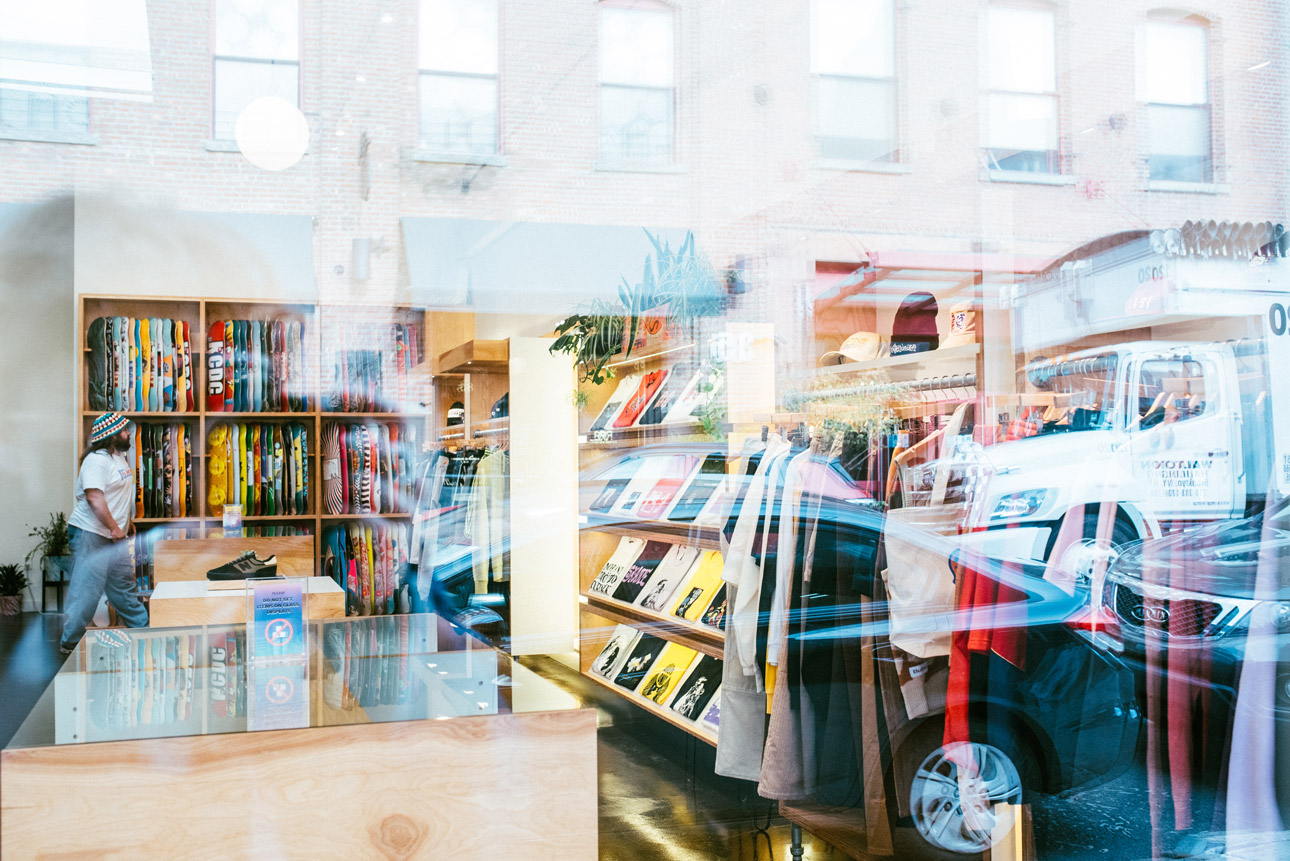

When I began chatting with Amy Ellington, owner of Brooklyn’s KCDC skate shop, I anticipated that the last year would have rocked this small business. I imagined they would have had to find new and creative ways to serve the community that they normally reached with their brick-and-mortar building and with their in-person events—everything from hosting yoga to featuring visual artists.
It only took ten minutes into our hour-long conversation to realize that the pandemic is not the first national or international crisis that has affected KCDC. They always made it through because they grew up in New York, and like true New Yorkers, they learned how to stand steady as the train rattles from stop to stop. They’ve learned how to continue to create and innovate, even if the ground is never stable.
“I feel like that’s how stuff has really been for me,” Amy began, “trial by fire. I’m like, ok, this happened, how do I learn from this experience.”
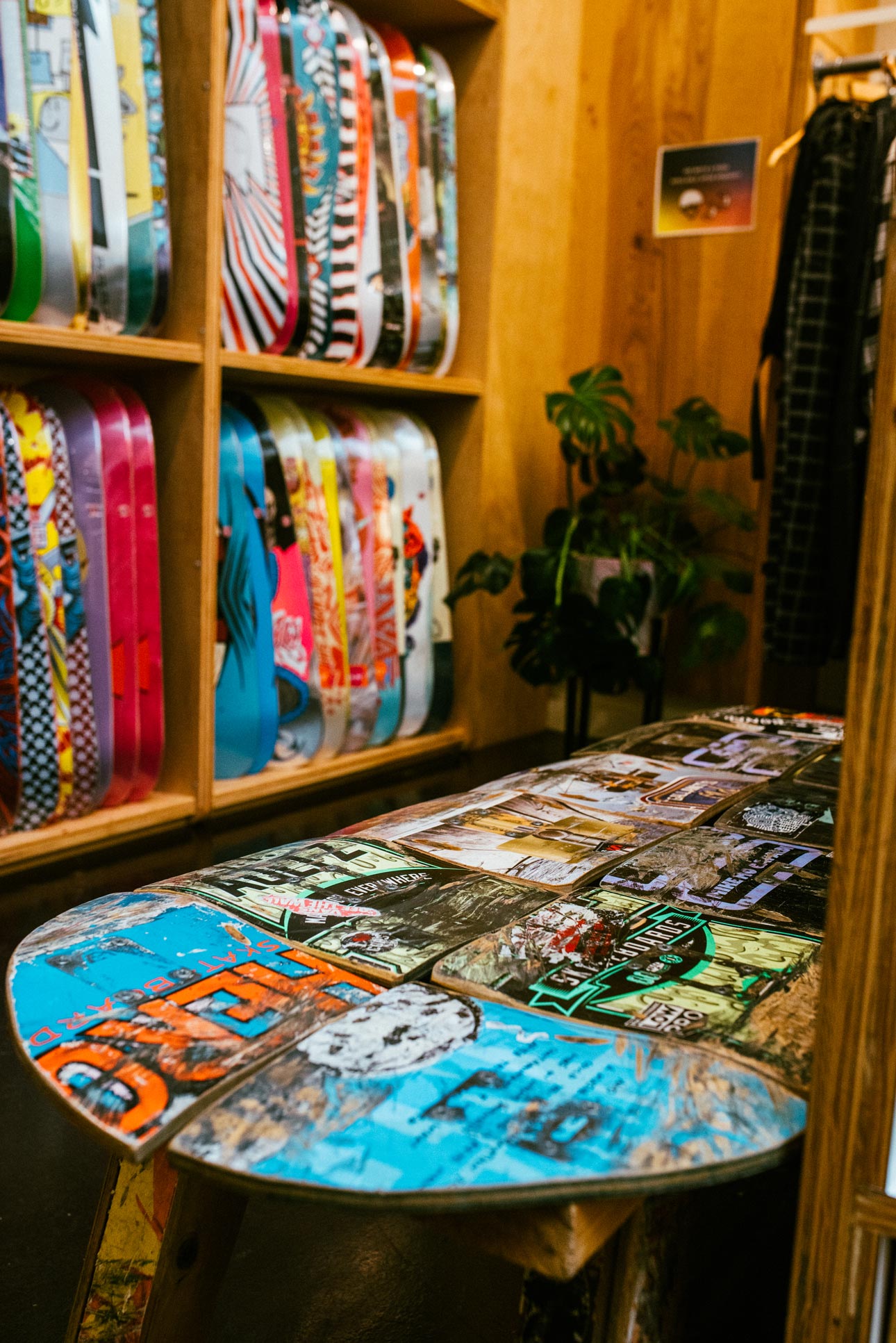
KCDC was birthed in the middle of national and local turmoil and they’ve been rebirthing themselves ever since, continually creating new ways to engage and encourage their local community. Amy explained, “We opened in November of 2001. We had the biggest situation of my entire life happen two months before that. We were already in the space when September 11th happened. So from the beginning of KCDC we already were back on our heels a little bit.” Everything was uncertain, but they showed up and decided to move forward with their plan to open the shop.
“It was like an emergency disaster area. And that was the real root of how we started supporting the community. [It] was not just the skate community—it was like, everybody.”
In 2003, parts of the US East Coast were hit with a blackout, including New York City and Brooklyn. KCDC had an event scheduled that weekend, but with the lack of power and the lack of widespread cell phone usage, everything was turned on its head in a moment. Turmoil offers the opportunity to draw yourself in or open yourself up, and Amy and her team chose the latter, opening up their doors to the community. “We opened the shop up to anybody that needed a place to be, to use… like, message other people or leave messages for people. With the blackout, everybody’s refrigerators died so people had tons of food to get rid of. So we were allowing people to leave food with us and we’d give it to other people. It was like an emergency disaster area. And that was the real root of how we started supporting the community. [It] was not just the skate community—it was like, everybody.”
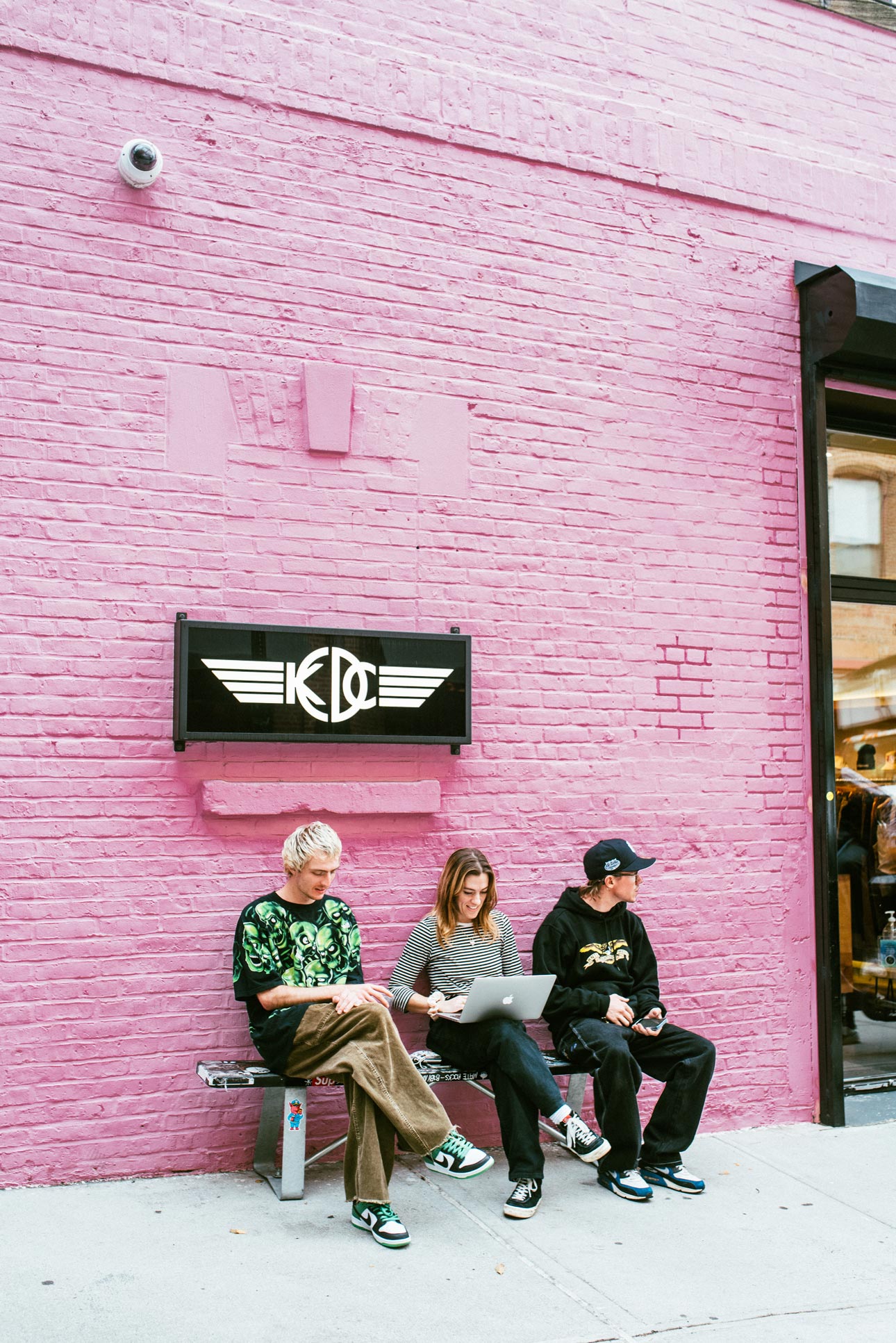
I’d say that KCDC became a place for community, but I think it always was that. When they first opened in Williamsburg, it wasn’t the thriving gentrified hipster mecca you would visit today. Back then it was on the verge, or whatever exists just before being on the verge: it was all warehouses and artist lofts and tiny venues. Amy described, “And just from the beginning, seeing how the community responded to us, I was like, oh my god, this community like, needs us. And I need to continue to create these events and create a real place for people to come to. Because there was nothing at the time when we opened.”
So, yes, KCDC is a business, but it’s a business and something else. It’s a business and a space for the community. It’s a business and a place to belong. Those community relationships go well beyond purchases and those relationships have kept KCDC alive, through 9/11, through the recession, and now through Covid.
Mirroring the shop’s dual purpose, Amy explained to me that she uses her space to allow the community, and allow skaters, to be their whole selves. They don’t have to be just a skater. They can be a skater and a photographer. They can be a skater and a videographer. They can be nuanced and creative and they can find a space to belong as their whole selves. “I want to create an environment where everybody can be the best they want to be and do anything and not feel weird about it,” she explained. They can be a novice, they can be an expert, or they can be a non-skating community member who stumbled upon their shop. There’s space for all those things and connections.
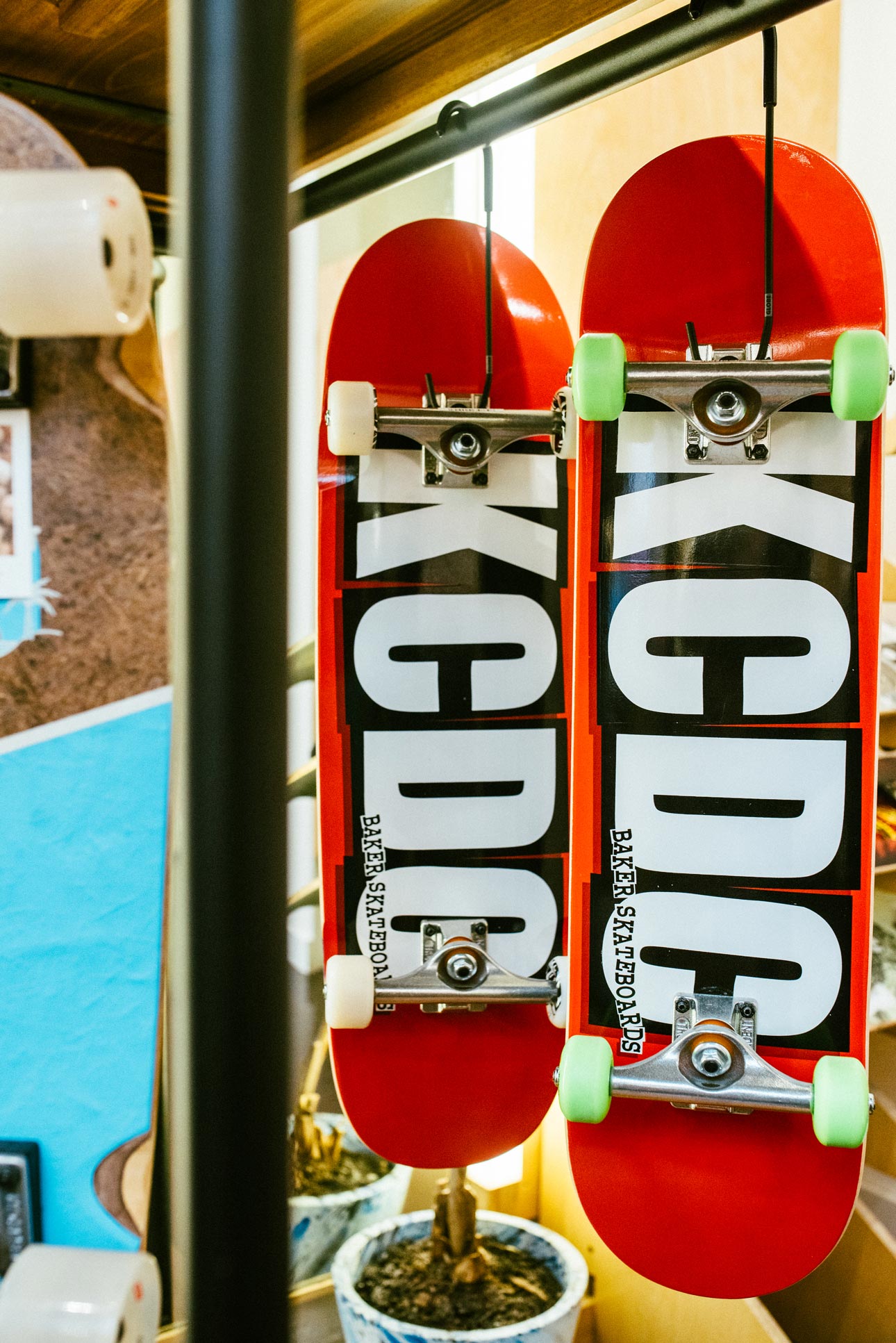
She expounded: “I just think skateboarders are creative people and it’s not the only thing that they do. So I’ve always been really open to allowing a forum for these other things. Through these art shows and stuff from the beginning, we were showing work from skateboarders who had taken an interest in taking photos. Or painting. Or doing sculpting, ‘cause I think that was really cool that they express themselves on a skateboard and also do this other thing. And for them, they were like, ‘Oh, my photos are not that great, blah blah, blah.’ And it’s like who cares? We’re not an art gallery. You know it’s more like: show something you’re passionate about. And it actually allows other people to follow their own passions.”
Amy herself modeled this from the beginning, as a skateboarder and as an entrepreneur and as a business owner—as more than one thing herself—and the staff reflect this, too: “I love that people can just come in and maybe see somebody working at the shop that’s a filmer or a designer or a photographer or a painter and these people are doing cool stuff. And [the customers are] actually influenced, like, by the positive things that my staff does. It’s kind of like this double whammy of experience for them.”
If there are two things needed to survive something unsteady, they are a place to belong and someone else to hold onto when it all becomes too heavy. On the train, sometimes that’s a chair or a bench, or a bar to grab when you’re standing. In life and in New York, that looks a lot like a skate shop and being welcomed in as a whole person, being allowed to show up exactly as you are, and being surrounded by other people who are doing the same thing.
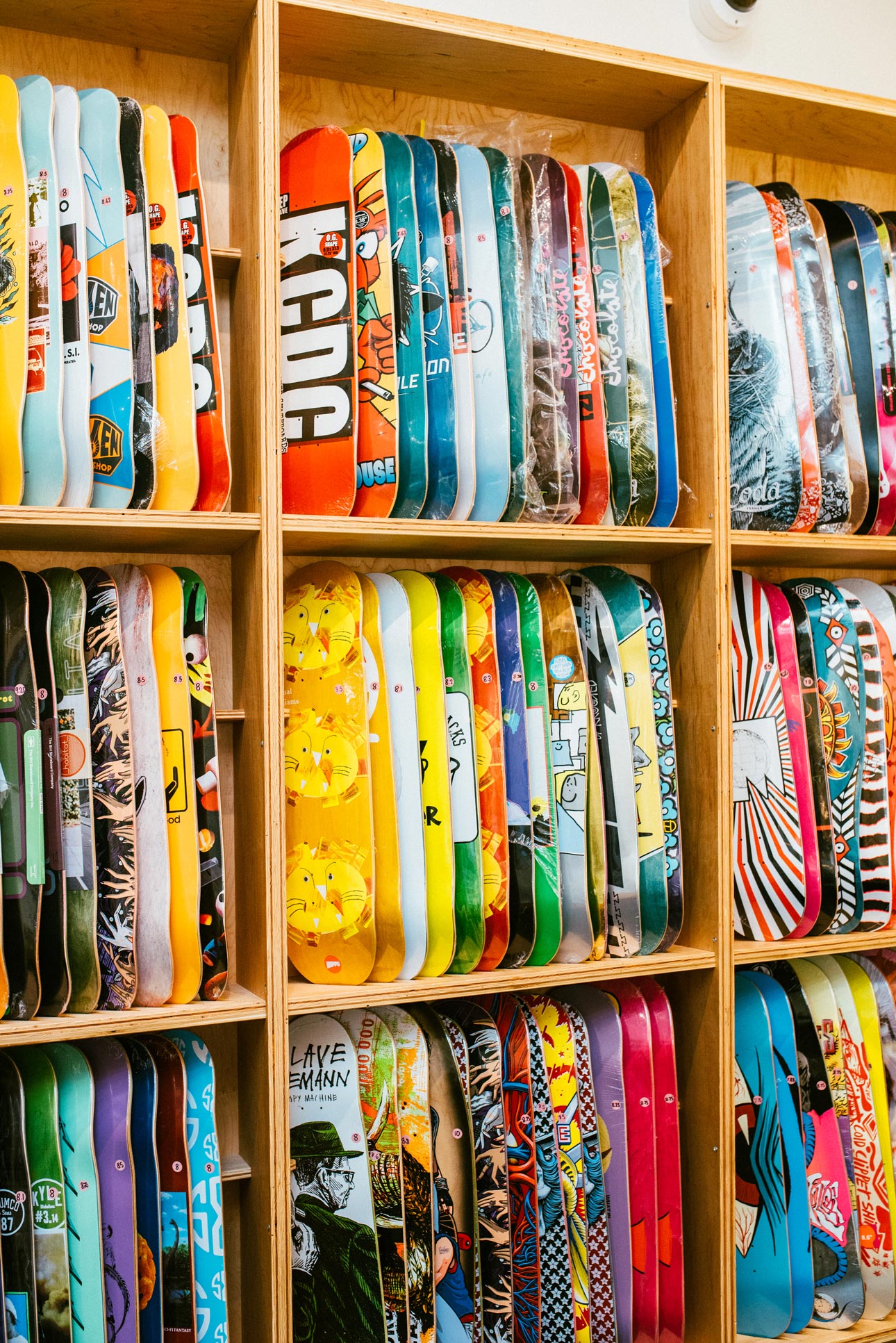
Yet another difficult season hit with the recession: “It was the first time we actually saw skateboarding become more popular than other things. It was similar to the pandemic, with people wanting to skateboard in terms of that it was an inexpensive way to get from point A to B, and it was safe… People honestly couldn’t afford to use public transportation and it was at a time where Lyft and Uber weren’t a big thing. So we sold more skateboards than ever during that time.”
“People honestly couldn’t afford to use public transportation … So we sold more skateboards than ever during that time.”
“So we were very prepared when the pandemic hit. I just knew that skateboarding was going to hit again.” KCDC was prepared to hold the space, skating on the unsteady ground, and helping others to do the same. They’d spent years learning how to keep their balance and it would take more than a pandemic to knock them down. Community is not a KPI you can measure, the way you can with money, but it was never about the money. It was always about the people.

“There are no results or some crazy financial gain that I expect,” Amy explains, “Like, my gain is seeing what my store does to the community and to New York. Women business owners and girls starting things feel comfortable coming to me, asking me questions about how to set stuff up or squash the beef between girl groups that are fighting. That I’m allowed to express the wisdom that I’ve learned from doing this. That’s priceless to me.”
As far as sticking it out in New York, despite it all, was it worth it? “It’s tough. And I did it anyway. And I have no regrets with choosing the life that I’ve chosen.”
We don’t know what celebrations or crises the next decade will bring, but perhaps the bravest way to run a business, to step into the future, to live without regrets, is to show up as a whole person and create spaces that allow others to do the same. And in the midst of a life of skinned knees and uncertain years, perhaps it’s the way we care for each other that keeps us steady.
Words & photos: Liz Brown
In the era of post-Olympic skateboarding, Mariah Davenport has a message to the new generation. This is her guide to preserving skate culture.
If you were to drift off into a day dream about skateboarding around NYC on a perfect summer day, it…
Hannah Bailey's new photo series is shining the light on the faces of female and non-binary skateboarders, empowering them to…